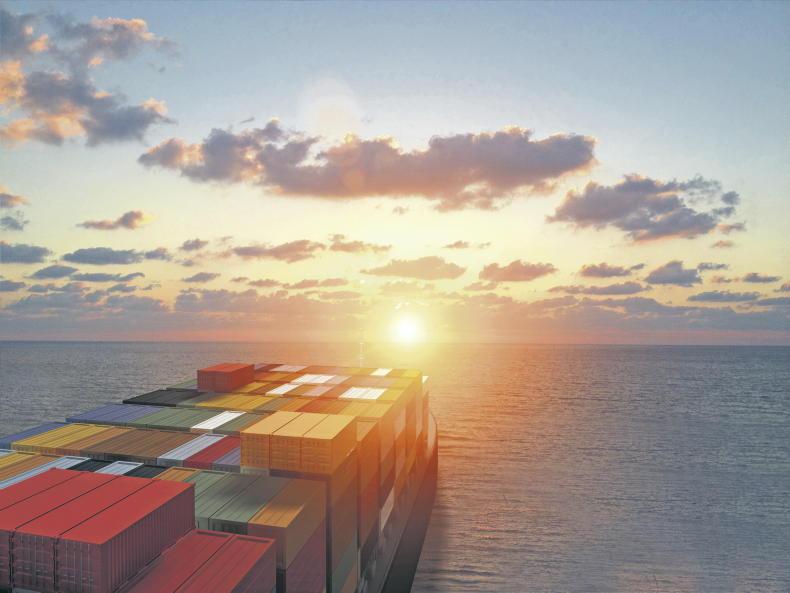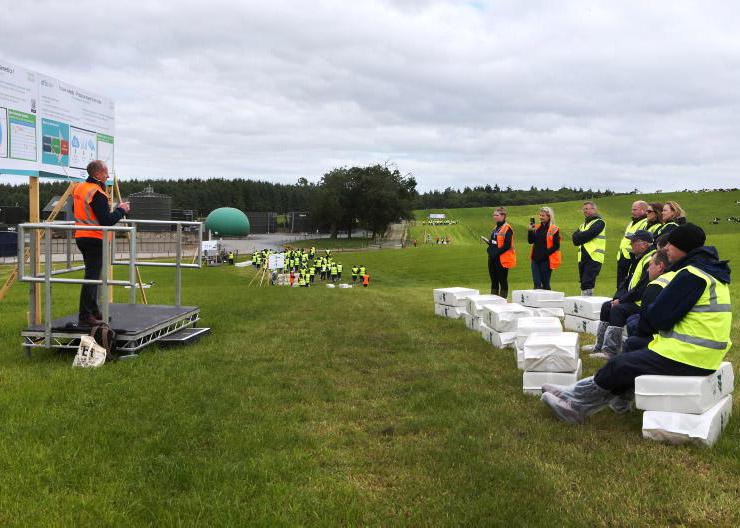Policy makers and politicians need to work with the farming industry to create policies that actually limit our impact on global warming, not alienate farmers from the entire discussion around climate change, a leading climate scientist has said.
Delivering a presentation to around 800 farmers attending a climate summit organised by the Irish Farmers Journal on Wednesday, Professor Myles Allen from Oxford University appealed for new thinking around how biogenic methane is assessed.
“Methane is a different gas, it behaves in a totally different way. We need a [separate] target for biogenic methane which reflects its impact on global temperature,” said Allen.
At present, around two-thirds of greenhouse gas (GHG) emissions from NI agriculture are biogenic methane produced by ruminating livestock.
Independent analysis by accountancy firm KPMG has shown that the cattle and sheep sector in NI would have to be virtually wiped out in order to achieve net zero for all emissions, including methane.
Misunderstood
During his presentation, Prof Allen explained that methane is a potent GHG, but is very badly misunderstood.
It is short-lived in the atmosphere, unlike other gases such as carbon dioxide (CO2) and nitrous oxide (N2O), which remain for centuries.
As a result, methane released today replaces methane released 10 to 20 years previously, so a stable cattle herd does not have a warming effect.
Reducing methane leads to global cooling, but, on the other hand, increasing methane will cause significant warming.
Calculations
In his calculations, Prof Allen said that if NI agriculture reduced CO2 and N20 to zero by 2050 and reduced methane emissions by 14% over the same period, it is enough to stop NI agriculture causing any global warming after 2035.
“That’s not what we are asking the transport sector to do – we would like the transport sector to stop causing global warming by 2050,” he argued.
He said that if NI politicians continue with their plan for all GHG emissions (including methane) to be net zero by 2050, it essentially means you would end up taking the NI agriculture contribution to global warming back to the level it was in 1980.
“For the transport sector to do that, it would not be enough for everybody to start driving electric cars powered by renewable energy tomorrow.
"We would also have to clean out of the atmosphere all the carbon dioxide emitted by the transport sector between 1980 and today. That would be the equivalent ask,” said Allen.
You are being asked to do far, far more than any other sector
“You are being asked to do far, far more than any other sector by these [net zero] targets.
"You are being asked not just to stop causing any further global warming from now on, but to actually undo all the warming you have caused since 1980. No other sector is being asked to do that,” he added.
He also suggested that the reason some policy makers prefer to ignore the arguments around methane is because they think it is easier to reduce cattle and sheep numbers than ask the owner of a closed power station to take their carbon back out of the atmosphere.
“I put it to this audience – is that true? Is this going to be easy for you?”
Challenge to politicians
The Oxford professor challenged local politicians to be “pioneers in the world by thinking this through” and end up with a policy that actually incentivises the ultimate goal, which should be to limit our impact on global temperature rise.
“This pretence that we have to reduce methane to zero is actually making a hard task impossible.
"That is why I find this whole debate so frustrating, because, actually, you guys are the solution. We should be working together on this, not picking fights.
“We have to get this right. We cannot solve the climate crisis without the farming community. The certain way to failure is to shove the farming community out the door,” he concluded.
Read more
Watch back: NI climate change summit
Final push to amend NI climate bill
Policy makers and politicians need to work with the farming industry to create policies that actually limit our impact on global warming, not alienate farmers from the entire discussion around climate change, a leading climate scientist has said.
Delivering a presentation to around 800 farmers attending a climate summit organised by the Irish Farmers Journal on Wednesday, Professor Myles Allen from Oxford University appealed for new thinking around how biogenic methane is assessed.
“Methane is a different gas, it behaves in a totally different way. We need a [separate] target for biogenic methane which reflects its impact on global temperature,” said Allen.
At present, around two-thirds of greenhouse gas (GHG) emissions from NI agriculture are biogenic methane produced by ruminating livestock.
Independent analysis by accountancy firm KPMG has shown that the cattle and sheep sector in NI would have to be virtually wiped out in order to achieve net zero for all emissions, including methane.
Misunderstood
During his presentation, Prof Allen explained that methane is a potent GHG, but is very badly misunderstood.
It is short-lived in the atmosphere, unlike other gases such as carbon dioxide (CO2) and nitrous oxide (N2O), which remain for centuries.
As a result, methane released today replaces methane released 10 to 20 years previously, so a stable cattle herd does not have a warming effect.
Reducing methane leads to global cooling, but, on the other hand, increasing methane will cause significant warming.
Calculations
In his calculations, Prof Allen said that if NI agriculture reduced CO2 and N20 to zero by 2050 and reduced methane emissions by 14% over the same period, it is enough to stop NI agriculture causing any global warming after 2035.
“That’s not what we are asking the transport sector to do – we would like the transport sector to stop causing global warming by 2050,” he argued.
He said that if NI politicians continue with their plan for all GHG emissions (including methane) to be net zero by 2050, it essentially means you would end up taking the NI agriculture contribution to global warming back to the level it was in 1980.
“For the transport sector to do that, it would not be enough for everybody to start driving electric cars powered by renewable energy tomorrow.
"We would also have to clean out of the atmosphere all the carbon dioxide emitted by the transport sector between 1980 and today. That would be the equivalent ask,” said Allen.
You are being asked to do far, far more than any other sector
“You are being asked to do far, far more than any other sector by these [net zero] targets.
"You are being asked not just to stop causing any further global warming from now on, but to actually undo all the warming you have caused since 1980. No other sector is being asked to do that,” he added.
He also suggested that the reason some policy makers prefer to ignore the arguments around methane is because they think it is easier to reduce cattle and sheep numbers than ask the owner of a closed power station to take their carbon back out of the atmosphere.
“I put it to this audience – is that true? Is this going to be easy for you?”
Challenge to politicians
The Oxford professor challenged local politicians to be “pioneers in the world by thinking this through” and end up with a policy that actually incentivises the ultimate goal, which should be to limit our impact on global temperature rise.
“This pretence that we have to reduce methane to zero is actually making a hard task impossible.
"That is why I find this whole debate so frustrating, because, actually, you guys are the solution. We should be working together on this, not picking fights.
“We have to get this right. We cannot solve the climate crisis without the farming community. The certain way to failure is to shove the farming community out the door,” he concluded.
Read more
Watch back: NI climate change summit
Final push to amend NI climate bill









SHARING OPTIONS